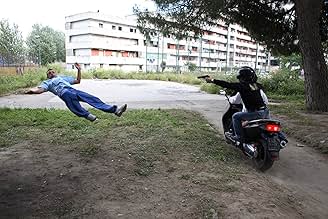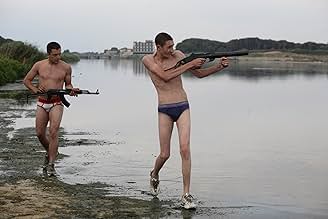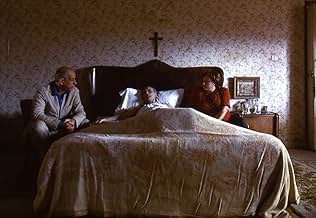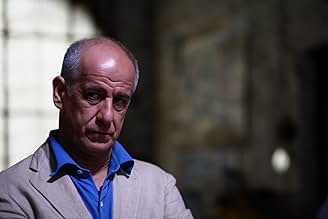VALUTAZIONE IMDb
7,0/10
52.369
LA TUA VALUTAZIONE
Uno sguardo dall'interno sulle famiglie criminali moderne in Italia.Uno sguardo dall'interno sulle famiglie criminali moderne in Italia.Uno sguardo dall'interno sulle famiglie criminali moderne in Italia.
- Regia
- Sceneggiatura
- Star
- Nominato ai 1 BAFTA Award
- 34 vittorie e 42 candidature totali
Salvatore Abbruzzese
- Totò
- (as Salvatore Abruzzese)
Vincenzo Altamura
- Gaetano
- (as Gaetano Altamura)
Recensioni in evidenza
The unglamourous reality of the workings of organised crime in Italy are revealed in this grim, thinly fictionalised story. There's no glamour here: just a form of business in which violence is an institutionalised part, a shadow state, in effect, only with a high rate of marginal taxation, a strong line on punishment, and no policy for the common welfare. The reality of how it feels to grow up in such an environment is plausibly conveyed. What we don't see, perhaps unsurprisingly, is too much sign of anyone showing heart; and in consequence, it's a bit hard to get into the story, and care for the mostly unsympathetic characters we meet. 'Gomorrah' isn't a great film; but it is a useful corrective against the myths of Hollywood, albeit one with a rather depressing view into one particular corner of the world.
Based on Roberto Saviano's best seller ( over 1.000.000 copies sold in Italy ), this movie is an inside look at Camorra's underworld in Naples, depicted as a sort of modern Dante's Inferno. Children and young guys are involved in a merciless, cruel struggle for life and blood money which has caused over 3.600 dead so far which is a bigger slaughter than the others committed by different criminal organizations in Italy and elsewhere. Five stories from Saviano's book have been chosen and told through a few professional actors and a lot of real people that never stood in front of a camera before. A heavy, gray sky hangs over these sleazy landscapes as if the beauty of one of the Italian lands of the sun had fled and the moral darkness had taken its place. Go watch this unconventional masterpiece as soon as it's released somewhere in your area.
A realistic film about the Neapolitan Mafia, The movie has a documentary touch which i really liked the most, the ending is perfect and real.
A must-see!
because, at the first sigh, nothing could be new. after many films about gangsters, crimes, South Italy, for the viewer must be clear the entire story. Gomorrah is an exception. for many reasons. first, because it is a real admirable work. then, because it is more than a story about murder and victims but a precise perspective about a large and complex mechanism. not the last, because it is the portrait of society as a collection of masks, sides and silences. and this does it more a support for reflection than entertainment in ordinary sense. the exploration of a huge labyrinth. in the middle of spider web.
Garners more respect than a spot on favorites list, "Gomorra" chronicles five seemingly disconnected stories with one thing in common: all are heavily influenced by a criminal organization run by the Camorras, an ominous mafia organization with a tight grip on Naples, Italy. Stylishly delivered, with extra kudos on editing and cinematography, Film will no doubt attract fans of the violent underworld, but might be disappointed by its verite approach, even if it perfectly captures reality, as such. Absolute antithesis to depiction from the American mafia, film is gritty and has zero entertainment value but in retrospect, picture was produced with such depressing intentions.
Multi plot film features more on characters attracted by the allure of the Camorras than the Camorras themselves. The five stories were plucked out from a novel by Roberto Saviano: the non-fiction that thrived on the best seller's list in Italy. Stories range from a coming of age teenager wanting to be identified with the mafia to a fresh university graduate looking for a promising vocation. Through varying levels of perspectives: from the violent eyed to the diplomatic, "Gomorra" stuns as it lists the organization's almost totalitarian control over the underbelly of Italy. It creates the impression of a country rotting from the inside out. With each story written by a different writer, what could have been an interconnection disaster is controlled well by director Matteo Garrone.
Ambitiously edited, fine balance between chaos and narrative is clearly defined by Marco Spoletini. First 40 minutes won't bode well for viewers looking for an easy diversion, as it is edited to confusion creating the illusion that the film started midway. Nonetheless, the stories do emerge, to great relief and from there on out, film would have established its style to a keen audience.
Cinematography, too is top notch. Marco Onorato paints Italy with a dull set of colors, resembling more of a third world purgatory rather than a honeymooner's travel brochure. Even Venice's bright reds and blues are muted with grey and brown with a hint of overexposure. Overall effect adds stupendously to the film as it gives it a sense of space and absolutely squashes any sense of hope an over-reader might derive.
Accuracy is greatly appreciated here. Film tries to blurry lines between dramatic film and documentary with impressive results. Details are all intact: dialogue is accurately more dialect derived, shooting locations seem extracted from a news clip and most thesping is done on dead-on accuracy by first timers.
With production values on stratospheric levels, film's overall intention is transparent: absolutely naught empathy is allowed, allowing audiences to soak in the moody atmosphere and simply co-exist with the protagonists clearly tested by circumstance. This will be its main predicament in garnering a more universal success as it asks a lot from an audience whose expectations might lean towards the slick of "Cidade de Deus".
With everything into consideration, film is too well choreographed that it becomes as intimidating as the organization that it exposes. Multiple plays won't be troublesome as every single detail here has a sense of subtext of tragedy unwilling to be diluted by repetition. However, might only be uncovered by fans willing to revisit.
Picture won the Grand Prize of the 2008 Cannes Film Festival.
Multi plot film features more on characters attracted by the allure of the Camorras than the Camorras themselves. The five stories were plucked out from a novel by Roberto Saviano: the non-fiction that thrived on the best seller's list in Italy. Stories range from a coming of age teenager wanting to be identified with the mafia to a fresh university graduate looking for a promising vocation. Through varying levels of perspectives: from the violent eyed to the diplomatic, "Gomorra" stuns as it lists the organization's almost totalitarian control over the underbelly of Italy. It creates the impression of a country rotting from the inside out. With each story written by a different writer, what could have been an interconnection disaster is controlled well by director Matteo Garrone.
Ambitiously edited, fine balance between chaos and narrative is clearly defined by Marco Spoletini. First 40 minutes won't bode well for viewers looking for an easy diversion, as it is edited to confusion creating the illusion that the film started midway. Nonetheless, the stories do emerge, to great relief and from there on out, film would have established its style to a keen audience.
Cinematography, too is top notch. Marco Onorato paints Italy with a dull set of colors, resembling more of a third world purgatory rather than a honeymooner's travel brochure. Even Venice's bright reds and blues are muted with grey and brown with a hint of overexposure. Overall effect adds stupendously to the film as it gives it a sense of space and absolutely squashes any sense of hope an over-reader might derive.
Accuracy is greatly appreciated here. Film tries to blurry lines between dramatic film and documentary with impressive results. Details are all intact: dialogue is accurately more dialect derived, shooting locations seem extracted from a news clip and most thesping is done on dead-on accuracy by first timers.
With production values on stratospheric levels, film's overall intention is transparent: absolutely naught empathy is allowed, allowing audiences to soak in the moody atmosphere and simply co-exist with the protagonists clearly tested by circumstance. This will be its main predicament in garnering a more universal success as it asks a lot from an audience whose expectations might lean towards the slick of "Cidade de Deus".
With everything into consideration, film is too well choreographed that it becomes as intimidating as the organization that it exposes. Multiple plays won't be troublesome as every single detail here has a sense of subtext of tragedy unwilling to be diluted by repetition. However, might only be uncovered by fans willing to revisit.
Picture won the Grand Prize of the 2008 Cannes Film Festival.
Lo sapevi?
- QuizRoberto Saviano got death threats from the Camorra for exposing their activities in the novel and movie, and is now permanently under police protection.
- BlooperAt the beginning of the movie you can clearly see the character named Amerigo belly moving, when his dead body remains on the chair, where he has been having his nails cut.
- Versioni alternativeIn 2020 Matteo Garrone re-cut the movie, reducing the length to 125 minutes.
- ConnessioniFeatured in De wereld draait door: Episodio #4.31 (2008)
- Colonne sonoreHerculaneum
Written by Robert Del Naja and Neil Davidge
Performed by Massive Attack
Additional programming by Euan Dickinson
Courtesy of One Point Six
I più visti
Accedi per valutare e creare un elenco di titoli salvati per ottenere consigli personalizzati
Dettagli
Botteghino
- Lordo Stati Uniti e Canada
- 1.579.146 USD
- Fine settimana di apertura Stati Uniti e Canada
- 5532 USD
- 21 dic 2008
- Lordo in tutto il mondo
- 34.861.529 USD
- Tempo di esecuzione2 ore 17 minuti
- Colore
- Mix di suoni
- Proporzioni
- 2.35 : 1
Contribuisci a questa pagina
Suggerisci una modifica o aggiungi i contenuti mancanti


![Guarda Trailer originale italiano [OV]](https://m.media-amazon.com/images/M/MV5BMjYxMDk3OTItZDQxNC00MTlkLTlkNGYtZWVhMzgzM2M5NWFmXkEyXkFqcGdeQXRyYW5zY29kZS13b3JrZmxvdw@@._V1_QL75_UY281_CR13)























